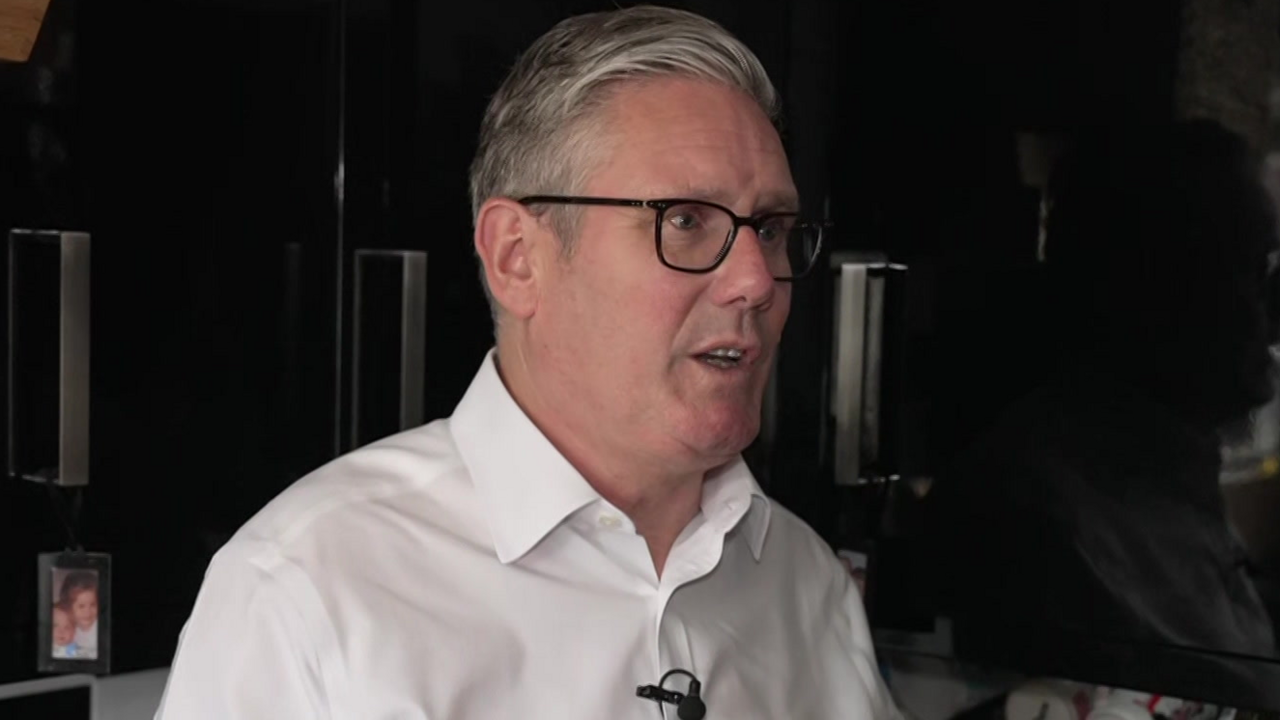Starmer urges diplomacy as Trump considers Iran attack

- Published
Prime Minister Sir Keir Starmer has urged further negotiations rather than an escalation of the Israel-Iran conflict.
His latest call comes as President Donald Trump considers whether to join Israeli strikes, with the BBC's US partner CBS reporting he has approved attack plans but has not made a final decision.
Conservative shadow foreign secretary Dame Priti Patel has called on the UK government to back the US if it attacks Iran, as has former Conservative foreign secretary Jeremy Hunt.
However, Britain's top legal adviser Lord Hermer has reportedly raised concerns about UK involvement in some of a range of scenarios.
Responding to reports advice included that UK military action should be limited to defensive support, a senior government source told the BBC: "It is not as simple as that."
Dame Priti has argued the UK cannot "hide behind legal advice at a time of crisis".
But Liberal Democrat leader Sir Ed Davey called for any legal advice to be published, adding: "The last thing we need is for the UK to be dragged into another illegal war in the Middle East by the US."
Asked about the potential for UK involvement with any US strike, Sir Keir said the "nuclear issue needs to be dealt with but it is better dealt with by way of negotiation than by way of conflict".
Pressed on any legal advice he may have received from Lord Hermer, the prime minister said "the Attorney's advice is never disclosed by any government" but that "the principle, the driving intent is de-escalation".
Sir Keir added: "all of us are very concerned about the nuclear programme Iran is developing.
"We also recognise Israel's right to self-defence," he said, adding: "We need to de-escalate. The risk of escalation in the region is obvious."
Foreign Secretary David Lammy is in Washington to meet his US counterpart Marco Rubio, initially scheduled for Monday, when Lammy chaired a meeting with Iran and EU representatives about the escalation of Iran's nuclear programme.
The pair will be seeking to smooth over a disagreement last week, when Rubio condemned the UK's decision to sanction two far-right Israeli cabinet ministers, alongside France, Germany, Canada and Australia.
Lammy will then travel to Geneva for talks with the EU's top diplomat, Kaja Kallas, his counterparts from Germany and France, and Iran's foreign minister Abbas Araghchi, who has insisted his country was committed to diplomacy.
With speculation mounting about possible UK involvement if the US decide to intervene, the Conservatives have said they would support the government assisting the US in Iran.
Speaking on BBC Breakfast, Dame Priti said said "we should be working with our allies, working alongside the US and Israel".
She added: "If the US came to the UK and said 'we need your assistance', through use of our bases or even re-fuelling aircraft, obviously we would support that, my party would support that, working with the government and basing that on private discussions obviously based on intelligence, legal advice, security information."
She stressed that strikes have taken place "to degrade Iran's nuclear capabilities and their ballistic missile capabilities, which are a threat to us in the UK".
The US may want to use the UK's military base at Diego Garcia in the Indian Ocean to launch American B-2 stealth bombers.
These are the "bunker busting" aircraft that it is believed would be able to destroy the Iranian's underground Fordo nuclear enrichment plan.
Former Foreign Secretary Sir Jeremy Hunt has said that if President Trump seeks UK military support against Iran, the UK should "stand by him" and that once military action begins, "you have to see it through, you have to make sure you win".
He told the BBC's Politics Live that if the UK chose not to support the US if they go to war in Iran, "let's not kid ourselves there is a price that would be paid."
There are, however, reports the Attorney General Lord Hermer has privately raised questions over whether Israel's actions in Iran are lawful, which would restrict the government's ability to support any US action.
Israel has justified its war by claiming that Iran's nuclear weapons programme poses an "imminent" and "existential" threat - although Iran claims the programme is peaceful.
The two countries have been exchanging fire for days after air strikes, which Tel Aviv said were aimed at preventing Tehran from developing a nuclear weapon.
The UK helped defend Israel from Iranian missile and drone strikes during a confrontation last year.
The International Atomic Energy Agency (IAEA), has said Iran has amassed enough uranium, enriched up to 60% purity - a short technical step away from weapons grade, or 90% - to potentially make nuclear bombs.
But, in an interview with BBC's chief international correspondent Lyse Doucet, Iran's deputy foreign minister Saeed Khatibzadeh denied this, and blamed Israel for starting the war.
"This is nonsense," Khatibzadeh said. "You cannot start a war based on speculation or intention."
The chair of the foreign affairs select committee, Emily Thornberry, has said that it is not "justifiable" for the UK to get involved in the conflict between Israel and Iran, and should "keep away" because "we haven't been attacked ourselves".
Asked on BBC Radio 4's World at One programme if the UK should obstruct any American involvement - for example if the US wanted to use a shared base such as Diego Garcia - the Labour MP said her position is "not to obstruct but not to actively assist".
Thornberry also told Radio 5 Live's Matt Chorley she believed there should be a vote in parliament before any military action.
Meanwhile, a Foreign Office source has said the UK government stands ready to evacuate British nationals from Tel Aviv as soon as airspace re-opens for non-military flights, and officials are working on other ways to help people leave Israel.